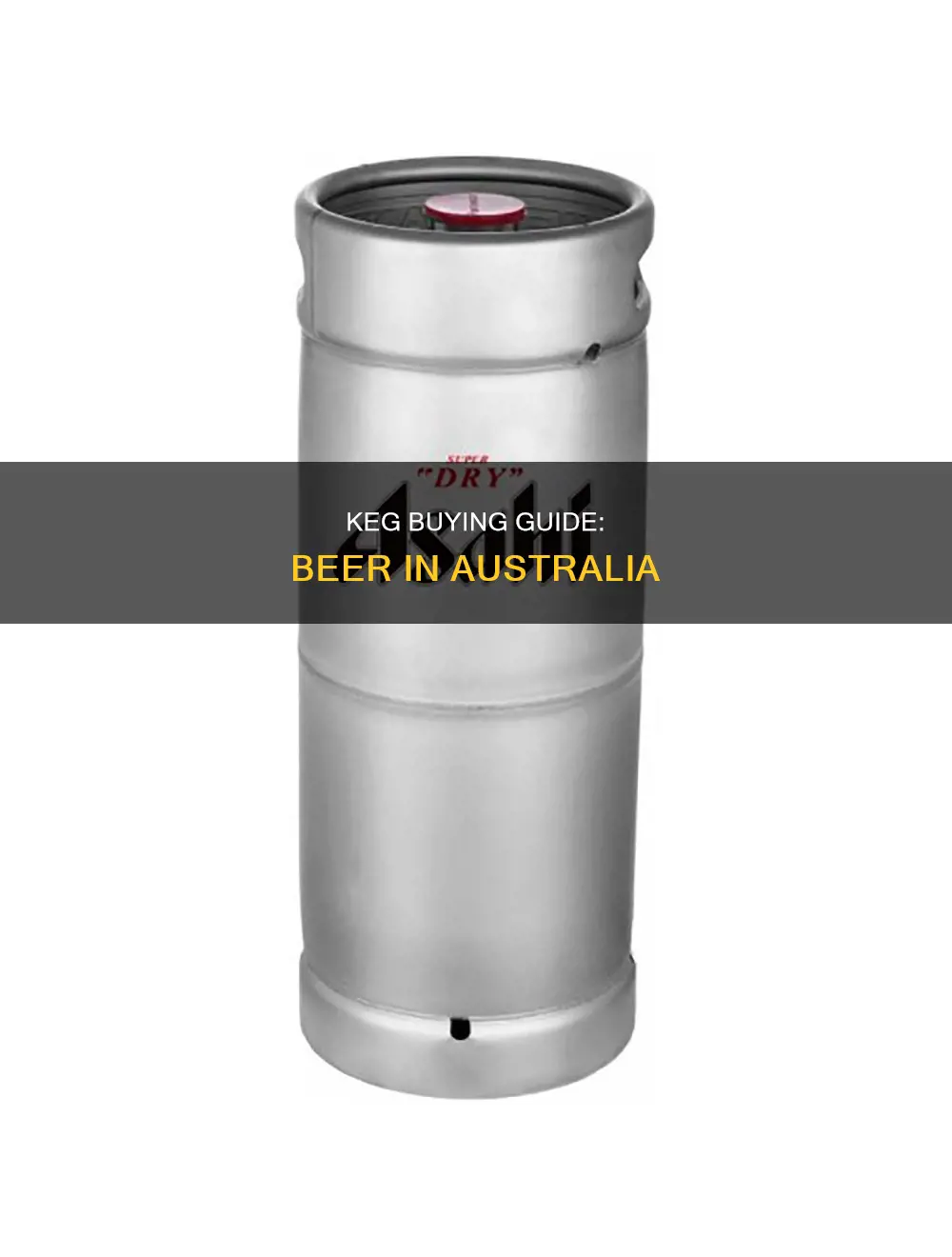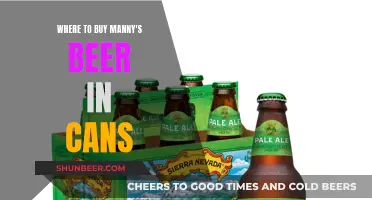
If you're looking to buy a keg of beer in Australia, there are a few things you should know. Firstly, kegs are a great way to store and transport beer, offering efficiency and cost-effectiveness. They come in various sizes, with the standard being made from stainless steel or aluminum and holding 5 to 15.5 gallons of beer. In Australia, you can purchase kegs from online retailers, physical stores, or even consider second-hand options. Online retailers like Kegs on Legs and Beer Cartel offer convenience and a wide range of options, while physical stores such as Dan Murphy's and BWS allow you to see the products in person. The average cost of a keg in Australia is around $200, but prices can vary depending on brand, alcohol content, size, and location.
| Characteristics | Values |
|---|---|
| Keg capacity | 5 gallons (19 liters) to 15.5 gallons (59 liters) |
| Keg material | Stainless steel or aluminum |
| Beer preservation method | Pressurized with carbon dioxide or nitrogen gas |
| Cost of kegs | Average cost: $200; Range: $150 to $350+; Online: $85 for 10L |
| Online retailers | Kegs on Legs, Beer Cartel, KegSwappa |
| Physical stores | Dan Murphy's, BWS, breweries |
| Second-hand options | Gumtree, Facebook Marketplace |
What You'll Learn

Kegs delivered to your door
There are several options for getting kegs delivered to your door in Australia.
Kegs Off Tap
Kegs Off Tap offers a delivery service for their Off Tap Bars within 30km of the Brisbane CBD. They can usually deliver within 24-48 hours of your order being placed and payment being received. They also offer nationwide courier services to commercial addresses.
Kegs on Legs
Kegs on Legs offers a reliable keg delivery service, delivering kegs nationwide with low-cost heavy item delivery options. They have three warehouses located in Victoria, New South Wales, and Queensland. They also offer same-day delivery within 55km of their warehouses.
KegSwappa
KegSwappa is a marketplace that connects you with brewers so you can order online and have kegs delivered to your door. They offer a range of beers with savings of up to 40% compared to bottles and cans.
Keg Hire Australia
Keg Hire Australia offers delivery services for their portable bar systems, which include a range of beers, wines, cocktails, and ciders. They cater to events of various sizes, from 80 guests to several hundred.
Beer on Frontier Airlines: What's the Deal?
You may want to see also

Keg prices
For example, a 50L keg from popular brand Carlton Draught can cost around $350, while a 50L keg from VB, another well-known brand, is priced at approximately $320. In contrast, local breweries often offer more affordable options, with prices starting from $85 for a 10L keg.
The size of the keg is another important factor influencing the price. A half keg, containing around 15 gallons of beer, typically falls in the range of $150 to $300. Smaller kegs, such as the 19L or 9.5L "corny" kegs, are available at lower price points, with some even offering savings of over 40% compared to bottles and cans.
Additionally, the location of purchase can impact the cost. Online retailers and physical stores may have varying prices, and prices may also differ across states in Australia.
It is worth noting that the initial purchase of a keg is not the only expense to consider. Additional costs may include pouring gear, such as a party hand pump or a kegerator, which can cost as little as $89 or upwards of $1000, respectively.
College Basketball Games: Beer Availability and Accessibility
You may want to see also

Cost-effectiveness of kegs
Kegs are a cost-effective way to serve beer to large groups of people at parties or events. They are often cheaper than purchasing individual bottles or cans of beer and require less storage space. The cost of a keg can vary depending on the size and type of beer, with prices ranging from $70 to $200 for a standard half-barrel keg. A smaller pony keg typically costs between $70 and $120.
When comparing the cost of kegs to bottles or cans, it's important to consider the number of guests and the amount of beer you plan to serve. While buying in bulk with a keg can be more cost-effective for larger groups, it may not always be the most economical option for smaller gatherings. Additionally, there may be additional fees such as delivery or rental charges for tap equipment, as well as deposits on the kegs themselves.
On average, breweries offer a 20% saving when purchasing kegs over bottles and cans, and some offer savings of over 40%. For example, a half-barrel keg of Bud Light can cost between $79 and $139, depending on the market, and can serve around 165 beers. A quarter-keg, or pony keg, of Bud Light costs $80 and can serve about 83 12-ounce beers.
Kegs also have the added benefit of producing less packaging waste, which can account for about 40% of a beer's footprint. This makes them an environmentally friendly option compared to individual bottles or cans.
Pennsylvania Grocery Store Beer Buying Limits Explained
You may want to see also

Where to buy kegs
Kegs can be purchased from a variety of online and physical stores in Australia. Here are some options for where to buy kegs:
- Kegs Off Tap: This company offers a wide range of beer kegs, cider kegs, ginger beer kegs, cocktails, mixers, and wine kegs. They also provide draught systems for residential and corporate use, including kegerators and other equipment. They are available in QLD, NSW, and VIC.
- KegSwappa: KegSwappa is a unique marketplace that connects you directly with breweries. It offers the convenience of ordering online and then swapping or delivering kegs to your door. They provide a range of beer options, and you can also purchase pouring gear like hand pumps and kegerators.
- Kegs on Legs: With same-day delivery options in Sydney, Melbourne, and Tweed, Kegs on Legs offers a wide range of kegs, including beer, seltzer, and spirit options. They also provide mobile bar and beer system hire, as well as kegerators and other equipment for sale. They offer nationwide delivery to residential and commercial addresses.
- Keg King: Based in Melbourne, Keg King is a distributor of homebrew and beverage dispensing supplies. They offer a large range of products, including PET and stainless steel kegs, as well as other equipment.
These options provide a mix of online and physical store options, ensuring you can find a convenient way to purchase kegs in Australia.
Buying Beer on Easter: What's the Deal?
You may want to see also

Maintaining kegs
Cleaning the Kegs
It is important to clean and sanitise your kegs regularly. The process differs slightly depending on whether you are sanitising a keg to fill it with beer or cleaning an empty keg after the beer has been consumed.
Sanitising an Empty Keg Before Filling
- Vent the pressure in the keg by lifting the lid relief valve and removing the lid.
- Using a socket wrench and a deep driver socket, remove the liquid and gas posts from the keg (out = liquid, gas = in).
- Soak these small parts in a sanitising solution for at least 2 minutes.
- Remove the long liquid-side dip tube and place it inside the keg shell.
- Fill the shell with your chosen sanitising solution.
- Reassemble the keg by following the previous steps in reverse.
Cleaning an Empty Keg After Consumption
- Follow the same disassembly process as sanitising, but soak the small parts in a cleaning solution for 30 minutes to 1 hour, depending on how dirty the keg is.
- Air dry all parts after soaking.
- Reassemble the keg.
Maintaining Proper Pressure
Successful beer dispensing depends on maintaining the correct CO2 pressure. When you open the faucet, the CO2 pushes the beer out of the keg and then fills the empty space to maintain steady pressure.
Tips for Maintaining Proper Pressure:
- Store your CO2 tank upright; improper storage will affect its function and can damage your regulator.
- Check with your local distributor for the specific dispense pressure for your keg.
- Too much pressure will result in excessive foaming; adjust the regulator to a lower level and draw off a few pitchers to clear the lines, or use the relief valve on your coupler to bleed off excess pressure.
- If the pressure is left too high for over 24 hours, your beer will become over-carbonated and ruined.
- Low pressure can also cause excessive foaming, but the foam will have smaller, soapy bubbles.
- If you have low pressure, check your CO2 tank to ensure it is not empty or turned off, and check your regulator for the correct pressure and any obstructions in the air line.
- If you can't identify the problem, you may need to replace your CO2 regulator, as they typically need replacing every 4-6 years.
Cleaning Beer Lines
Beer lines should be cleaned regularly, ideally after every half-keg, as they collect deposits of yeast and sugar over time, which can negatively affect the taste of your beer and cause excess foaming. Use a beer line cleaning kit, which uses air pressure and a cleaning solution to sanitise the lines.
Maintaining the Outside of the Keg
Keep the outside of your keg fridge clean using normal cleaning agents and a good amount of elbow grease!
Where to Buy Corona Beer?
You may want to see also
Frequently asked questions
The average cost of a keg in Australia is around $200, but prices can vary depending on the brand, alcohol content, size, and location. For instance, a 50L keg from Carlton Draught can cost around $350, while a 50L keg from VB can cost around $320.
You can buy kegs of beer in Australia through online retailers or at physical stores. Popular online retailers include Kegs on Legs and Beer Cartel, while Dan Murphy's and BWS are well-known physical stores that carry kegs.
Buying from local breweries or opting for second-hand kegs can help you save money. Local breweries often have lower overhead costs, allowing them to offer more affordable prices. You can find second-hand kegs at lower prices on websites like Gumtree and Facebook Marketplace.
Kegs offer several advantages over bottles and cans. They are reusable, reducing waste and packaging costs for breweries. Kegs also provide better protection against light and oxygen exposure, which can affect the taste and quality of the beer.
To dispense beer from a keg, you'll need a tap or pump, as well as a keg fridge/kegerator. The cost of pouring gear can start at $89 for a party hand pump, while a keg fridge/kegerator will cost at least $1000.







